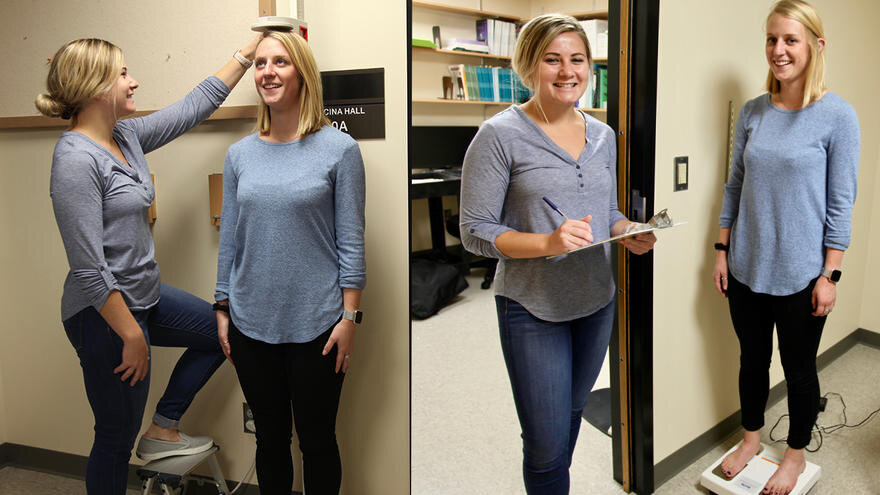Taking a scientific look at the “Freshman 15”
Hannah Appleseth takes measurements of Elaine Marshall. Photo by Lissa Maki, a communications specialist for the College of Education and Human Services Professions at UMD
Many incoming freshmen are warned of the dreaded “Freshman 15” before they enter college. But what is it exactly? Is it even a real thing or just another myth worried-parents believe?
Dr. Rick LaCaille and Dr. Lara LaCaille and their team are looking to answer such a question in UMD’s first in-depth study on this topic.
Rick LaCaille has been conducting studies on better ways to improve student health at UMD for many years. Now, he and his team are taking on a new study to better understand the “Freshman 15.”
“The idea of the Freshman 15 is that students gain fifteen pounds, but that tends to be a bit of an exaggeration,” Rick LaCaille said. “It doesn’t really pan out that way.”
There is a large percentage of students who do gain a sizeable amount of weight. However, even for these students, fifteen pounds is still an exaggeration.
Other students don’t experience any weight gain, while others experience weight loss. While still other students experience weight cycling, which Rick LaCaille described as having “big fluctuations of gaining and losing weight.”
So, gaining fifteen pounds doesn’t really cut it when describing how a student’s weight is affected by going to college. The college experience is different for everyone, and this includes how their weight changes.
The uniqueness of each individual’s college experience is precisely the reason Rick LaCaille was interested in conducting this study.
“The Freshman 15, that idea has been around for quite some time and so me and our research group have been interested in trying to study that and understand what contributes to it,” Rick LaCaille said.
Understanding why a student experiences a change in weight can contribute to understanding how to better improve student life on campus. By knowing what factors were present before a change in weight occurred, Rick LaCaille hopes to identify which of these factors is a predictor for weight change.
With this new knowledge, the team hopes to be able to change this factor and help students have better health habits.
But why is this study so important? What is the point? Well, Rick LaCaille isn’t just looking for data.
“The really important thing with this is not only to understand it, but ideally … to intervene or provide strategies to kind of help… [and] effect some change,” he said.
Intervention work is nothing new. Dr. Lara LaCaille has done interventions for students in the past. A few years ago, she did an intervention on appetite awareness. However, this study is bigger than interventions.
By collecting data and determining predicting factors, the team at the Department of Psychology will be able to provide some extremely important information when it comes to preventing unhealthy habits with weight.
After all, habits don’t just magically go away. The “Freshman 15” doesn’t just apply to freshman.
“The habits we develop at this critical junction in life have a way of sticking,” Rick LaCaille said.
So, is the “Freshman 15” a real thing? In a certain sense, yes. But more importantly, it’s the choices we make with both food and everything else that will have a lasting impact on our lives.
Editor’s Note: A previous version of the story had Lissa Maki listed as a development staff member when she is actually a communication specialist. The mistake has been fixed.

